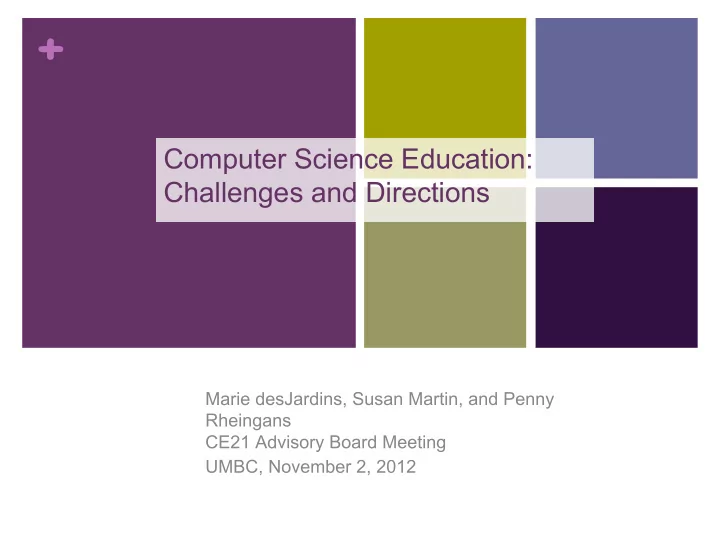

+ Computer Science Education: Challenges and Directions Marie desJardins, Susan Martin, and Penny Rheingans CE21 Advisory Board Meeting UMBC, November 2, 2012
+ Overview and Welcome Challenges in Computer Science Education (and what weṽre trying to do about it...) Broadening the classroom view of CS Broadening the diversity of CS students Broadening the pool of qualified CS teachers Broadening access to CS education through curricular reform Recommendations for Action
+ CS Education: A National Crisis We need many trained computer scientists There will be more new jobs in computing than in all other areas of STEM combined We are not producing enough computer scientists Enrollment in computing majors dropped dramatically in the 2000s Recently, enrollments have increased, but not nearly enough Our pool of computer scientists is not sufficiently diverse Women, African-Americans, and other ethnic minorities choose CS at a much lower rate than white males We donᾼt have enough highly qualified K-12 CS teachers We donᾼt have a strong K-12 CS curriculum
+ Lack of Gender Diversity in CS* In 2008, women earned: 57% of all Bachelorᾼs degrees 61% of Masterᾼs degrees 51% of Doctoral degrees But in 2008, women earned: 12% of Bachelorᾼs degrees in CS (the lowest percentage ever recorded) 26% of MS degrees in CS 21% of PhD degrees in CS Women are underrepresented in CS by a factor of more than 2 at the grad level, and by a factor of more than 4 at the undergrad level! * Statistics for CS, CE, and IS combined Source: CRA Taulbee Survey
+ Lack of Racial Diversity in CS In 2008, of Bachelorᾼs degrees in CS: 4.9% went to African-Americans (9.8% of all Bachelorᾼs) 6.8% to Hispanics (7.9% of all Bachelorᾼs) In 2008, of Masterᾼs degrees in CS: 2.7% went to African-Americans (10% of all Masterᾼs) 2.4% went to Hispanics (5.9% of all Masterᾼs) In 2008, of PhD degrees in CS: 1.6% went to African-Americans (6.1% of all PhDs) 1% to Hispanics (3.6% of all PhDs) Minorities are underrepresented by a factor of 4 at the grad level Source: CRA Taulbee Survey
+ Challenges in Teacher Preparation In most states (including Maryland!!): Certification requirements are unclear Current certifications do not meet the needs of the discipline Teachers without CS certification are often asked to teach CS classes (often due to a lack of certified/qualified teachers) There is inadequate in-service professional development to keep teachers abreast of new trends and knowledge
+ Challenges in K-12 Curriculum In most states (including Maryland!): Very few of the CSTA-identified K-12 CS standards are part of the standard curriculum* Computer science classes are not required for graduation, and in most cases donᾼt count towards any graduation requirement Many schools donᾼt offer computing courses beyond the level of keyboarding schools, and even fewer offer college preparatory CS courses * CSTA data on Maryland standards: 31 out of 35 Level I standards; 3 out of 10 Level II standards; 1 out of 10 Level III standards.
+ Teacher Survey: What We Learned Whoᾼs teaching? What are they teaching? Who are they teaching? What are their challenges? What do they need?
+
+
+ Teacher Certification
+
+
+ 2011-2012 Enrollment: Intro CS & AP
+ Percentage Girls: Intro CS and AP
+ Percentage Minorities: Intro CS & AP
+
+
+ Other Reported Challenges *Not on CSTA Survey Lack of parental encouragement for students to take CS 89% Lack of guidance staff knowledge about importance of CS 88% Lack of student math preparation 88% Lack of parental knowledge about the importance of CS 87% Inability to attract women and minorities to CS classes 75% Being asked to teach multiple CS related courses in the 74% same classroom at the same time Lack of support/interest by school leadership 74% Lack of a professional community of other CS instructors 71% Lack of internships for students 68% Lack of professional development opportunities 65% Creating a curriculum that satisfies district and state 63% standards Understanding state curriculum standards 57%
+
+
+
+ Recommendations Continue to grow the computer science education 1. network in Maryland. Educate the broader community about the CS 2. education crisis. Increase the availability of high-quality CS courses for 3. all Maryland high school students. Provide effective professional development 4. opportunities and develop certification programs to expand the number of highly qualified high school CS teachers.
+ Discussion Questions Does our snapshot of HS CS education seem accurate and complete? What do we still need to know? Do you agree with our recommendations for action? Where should we be headed with regard to HS CS education as a state? What should our priorities be? Through September 2013 (the term of the CE21-Maryland project)? Beyond September 2013?
Recommend
More recommend